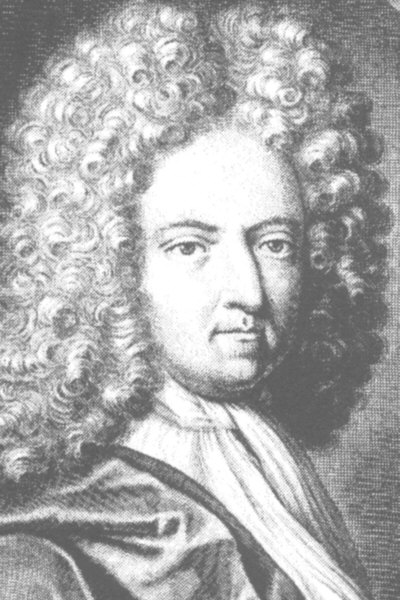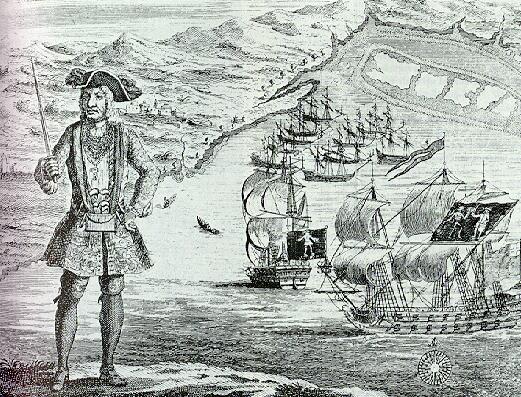|
Edward Thache
Captain Edward Thache (June 14, 1659 - November 16, 1706) was a wealthy plantation owner in the capital city of St. Jago de la Vega, or Spanish Town, Jamaica. His son Edward Thache Jr. is probably the well-known pirate Blackbeard, captain of the ''Queen Anne's Revenge'', and a Royal Navy veteran of Queen Anne's War on HMS ''Windsor''. Life Edward Thache was born in Stonehouse, Gloucestershire, the son of Anglican minister Rev. Thomas Thache and Rachel Nelme Thache of Sapperton, Gloucestershire, England. He most likely left the port of Bristol, Gloucestershire, England circa 1685 with his family: wife Elizabeth, son Edward Thache Jr. and daughter Elizabeth, for Jamaica in the West Indies. While records of Thaches are necessarily sparse in Bristol, a probable nephew of Capt. Thache, Thomas "Thatch", had lived in Bristol by 1712 and had leased a house "a mere block from the city docks" from his cousin Martin Nelme (Coroner of Bristol since 24 March 1697). The 1686 census for Bristo ... [...More Info...] [...Related Items...] OR: [Wikipedia] [Google] [Baidu] |
Spanish Town
Spanish Town ( jam, label= Jamaican Creole, Panish Tong) is the capital and the largest town in the parish of St. Catherine in the historic county of Middlesex, Jamaica. It was the Spanish and British capital of Jamaica from 1534 until 1872. The town is home to numerous memorials, the national archives, and one of the oldest Anglican churches outside England (the others are in Virginia, Maryland, and Bermuda ) , anthem = " God Save the King" , song_type = National song , song = "Hail to Bermuda" , image_map = , map_caption = , image_map2 = , mapsize2 = , map_caption2 = , subdivision_type = Sovereign state , subdivision_name = , ...). History The Spanish settlement of Villa de la Vega was founded by the Spanish in 1534 as the capital of the colony. Later, it was also called Santiago de la Vega or St. Jago de la Vega. Indigenous Taíno people, Taino had been living in the area for approximately a millennium before this, but this was the first Europea ... [...More Info...] [...Related Items...] OR: [Wikipedia] [Google] [Baidu] |
West Indies
The West Indies is a subregion of North America, surrounded by the North Atlantic Ocean and the Caribbean Sea that includes 13 independent island countries and 18 dependencies and other territories in three major archipelagos: the Greater Antilles, the Lesser Antilles, and the Lucayan Archipelago. The subregion includes all the islands in the Antilles, plus The Bahamas and the Turks and Caicos Islands, which are in the North Atlantic Ocean. Nowadays, the term West Indies is often interchangeable with the term Caribbean, although the latter may also include some Central and South American mainland nations which have Caribbean coastlines, such as Belize, French Guiana, Guyana, and Suriname, as well as the Atlantic island nations of Barbados, Bermuda, and Trinidad and Tobago, all of which are geographically distinct from the three main island groups, but culturally related. Origin and use of the term In 1492, Christopher Columbus became the first European to record ... [...More Info...] [...Related Items...] OR: [Wikipedia] [Google] [Baidu] |
People From Spanish Town
A person ( : people) is a being that has certain capacities or attributes such as reason, morality, consciousness or self-consciousness, and being a part of a culturally established form of social relations such as kinship, ownership of property, or legal responsibility. The defining features of personhood and, consequently, what makes a person count as a person, differ widely among cultures and contexts. In addition to the question of personhood, of what makes a being count as a person to begin with, there are further questions about personal identity and self: both about what makes any particular person that particular person instead of another, and about what makes a person at one time the same person as they were or will be at another time despite any intervening changes. The plural form "people" is often used to refer to an entire nation or ethnic group (as in "a people"), and this was the original meaning of the word; it subsequently acquired its use as a plural form of p ... [...More Info...] [...Related Items...] OR: [Wikipedia] [Google] [Baidu] |
1706 Deaths
Seventeen or 17 may refer to: * 17 (number), the natural number following 16 and preceding 18 * one of the years 17 BC, AD 17, 1917, 2017 Literature Magazines * ''Seventeen'' (American magazine), an American magazine * ''Seventeen'' (Japanese magazine), a Japanese magazine Novels * ''Seventeen'' (Tarkington novel), a 1916 novel by Booth Tarkington *''Seventeen'' (''Sebuntiin''), a 1961 novel by Kenzaburō Ōe * ''Seventeen'' (Serafin novel), a 2004 novel by Shan Serafin Stage and screen Film * ''Seventeen'' (1916 film), an American silent comedy film *''Number Seventeen'', a 1932 film directed by Alfred Hitchcock * ''Seventeen'' (1940 film), an American comedy film *'' Eric Soya's '17''' (Danish: ''Sytten''), a 1965 Danish comedy film * ''Seventeen'' (1985 film), a documentary film * ''17 Again'' (film), a 2009 film whose working title was ''17'' * ''Seventeen'' (2019 film), a Spanish drama film Television * ''Seventeen'' (TV drama), a 1994 UK dramatic short starring Chr ... [...More Info...] [...Related Items...] OR: [Wikipedia] [Google] [Baidu] |
1659 Births
Events January–March * January 14 – In the Battle of the Lines of Elvas, fought near the small city of Elvas in Portugal during the Portuguese Restoration War, the Spanish Army under the command of Luis Méndez de Haro suffers heavy casualties, with over 11,000 of its nearly 16,000 soldiers killed, wounded or taken prisoner; the smaller Portuguese force of 10,500 troops, commanded by André de Albuquerque Ribafria (who is killed in the battle) suffers less than 900 casualties. * January 24 – Pierre Corneille's ''Oedipe'' premieres in Paris. * January 27 – The third and final session of the Parliament of the Commonwealth of England, Scotland and Ireland is opened by Lord Protector Richard Cromwell, with Chaloner Chute as the Speaker of the House of Commons, with 567 members. " Cromwell's Other House", which replaced the House of Lords during the last years of the Protectorate, opens on the same day, with Richard Cromwell as its speaker. * Ja ... [...More Info...] [...Related Items...] OR: [Wikipedia] [Google] [Baidu] |
Nathaniel Mist
Nathaniel Mist (died 30 September 1737) was an 18th-century British printer and journalist whose ''Mist's Weekly Journal'' was the central, most visible, and most explicit opposition newspaper to the whig administrations of Robert Walpole. Where other opposition papers would defer, Mist's would explicitly attack the government of Walpole and the entire House of Hanover. He was a Jacobite of strong convictions and pugnacious determination who employed various authors writing under pseudonyms, from Lewis Theobald to Daniel Defoe, and was frequently tried by the government for sedition. His early years are obscure, and he first enters the public record and public eye as the owner of a successful printing press in 1716. As owner and master of the press, he began immediately to publish his own journals. His first effort, ''The Citizen,'' ran to only nine issues in 1716. His second effort was to take over ''Weekly Journal, or, Saturday's Post'' in December 1716. This would ... [...More Info...] [...Related Items...] OR: [Wikipedia] [Google] [Baidu] |
Captain Charles Johnson
Captain Charles Johnson was the British author of the 1724 book '' A General History of the Robberies and Murders of the most notorious Pyrates'', whose identity remains a mystery. No record exists of a captain by this name, and "Captain Charles Johnson" is generally considered a pen name for one of London's writer-publishers. Some scholars have suggested that the author was actually Daniel Defoe, but this is disputed. A prime source for the biographies of many well known pirates of the era, Johnson gave an almost mythical status to the more colourful characters, and it is likely that the author used considerable artistic licence in his accounts of pirate conversations. First appearing in Charles Rivington's shop in London, the book sold so well that by 1726, an enlarged fourth edition had appeared. English naval historian David Cordingly writes: "It has been said, and there seems no reason to question this, that Captain Johnson created the modern conception of pirates." Charac ... [...More Info...] [...Related Items...] OR: [Wikipedia] [Google] [Baidu] |
A General History Of The Pyrates
''A General History of the Robberies and Murders of the most notorious Pyrates'' is a 1724 book published in Britain containing biographies of contemporary pirates,''A general history of the robberies & murders of the most notorious pirates''. By Charles Johnson. Introduction and commentary by Emmett Remis. Conway Maritime Press, 2002. which was influential in shaping popular conceptions of pirates. Its author uses the name Captain Charles Johnson, generally considered a for one of London's writer-publishers. The pr ... [...More Info...] [...Related Items...] OR: [Wikipedia] [Google] [Baidu] |
Charles Leslie (writer)
Charles Leslie was a Barbadian writer who wrote about the history of Jamaica. Leslie was married to Rebecca Tirres on 20 July 1710, Saint Philip, Barbados. His book, ''A New and Exact History of Jamaica'', was published in Edinburgh, Scotland, in 1739. Leslie, while researching on Jamaica, had met the family of Edward Thache or "Blackbeard the Pirate." His family's wealth and affluence surprised Charles Leslie in 1739 who wrote that Blackbeard "was born in Jamaica of very creditable Parents; his Mother ucretia Thache, died in 1743is alive in Spanish Town Spanish Town ( jam, label=Jamaican Creole, Panish Tong) is the capital and the largest town in the parish of St. Catherine in the historic county of Middlesex, Jamaica. It was the Spanish and British capital of Jamaica from 1534 until 1872. Th ... to this Day, and his Brother ox Thache, died in 1737is at present the Captain of the Train of Artillery." References Barbadian male writers Barbadian historians 18th-cen ... [...More Info...] [...Related Items...] OR: [Wikipedia] [Google] [Baidu] |
Primogeniture
Primogeniture ( ) is the right, by law or custom, of the firstborn legitimate child to inheritance, inherit the parent's entire or main estate (law), estate in preference to shared inheritance among all or some children, any illegitimate child or any collateral relative. In most contexts, it means the inheritance of the firstborn son (agnatic primogeniture); it can also mean by the firstborn daughter (matrilineal primogeniture). Description The common definition given is also known as male-line primogeniture, the classical form popular in European jurisdictions among others until into the 20th century. In the absence of male-line offspring, variations were expounded to entitle a daughter or a brother or, in the absence of either, to another collateral relative, in a specified order (e.g. male-preference primogeniture, Salic primogeniture, semi-Salic primogeniture). Variations have tempered the traditional, sole-beneficiary, right (such as French appanage) or, in the West since ... [...More Info...] [...Related Items...] OR: [Wikipedia] [Google] [Baidu] |
Bristol
Bristol () is a city, ceremonial county and unitary authority in England. Situated on the River Avon, it is bordered by the ceremonial counties of Gloucestershire to the north and Somerset to the south. Bristol is the most populous city in South West England. The wider Bristol Built-up Area is the eleventh most populous urban area in the United Kingdom. Iron Age hillforts and Roman villas were built near the confluence of the rivers Frome and Avon. Around the beginning of the 11th century, the settlement was known as (Old English: 'the place at the bridge'). Bristol received a royal charter in 1155 and was historically divided between Gloucestershire and Somerset until 1373 when it became a county corporate. From the 13th to the 18th century, Bristol was among the top three English cities, after London, in tax receipts. A major port, Bristol was a starting place for early voyages of exploration to the New World. On a ship out of Bristol in 1497, John Cabot, a ... [...More Info...] [...Related Items...] OR: [Wikipedia] [Google] [Baidu] |
_-_1st_June_2015_08.jpg)
_1938.jpg)


